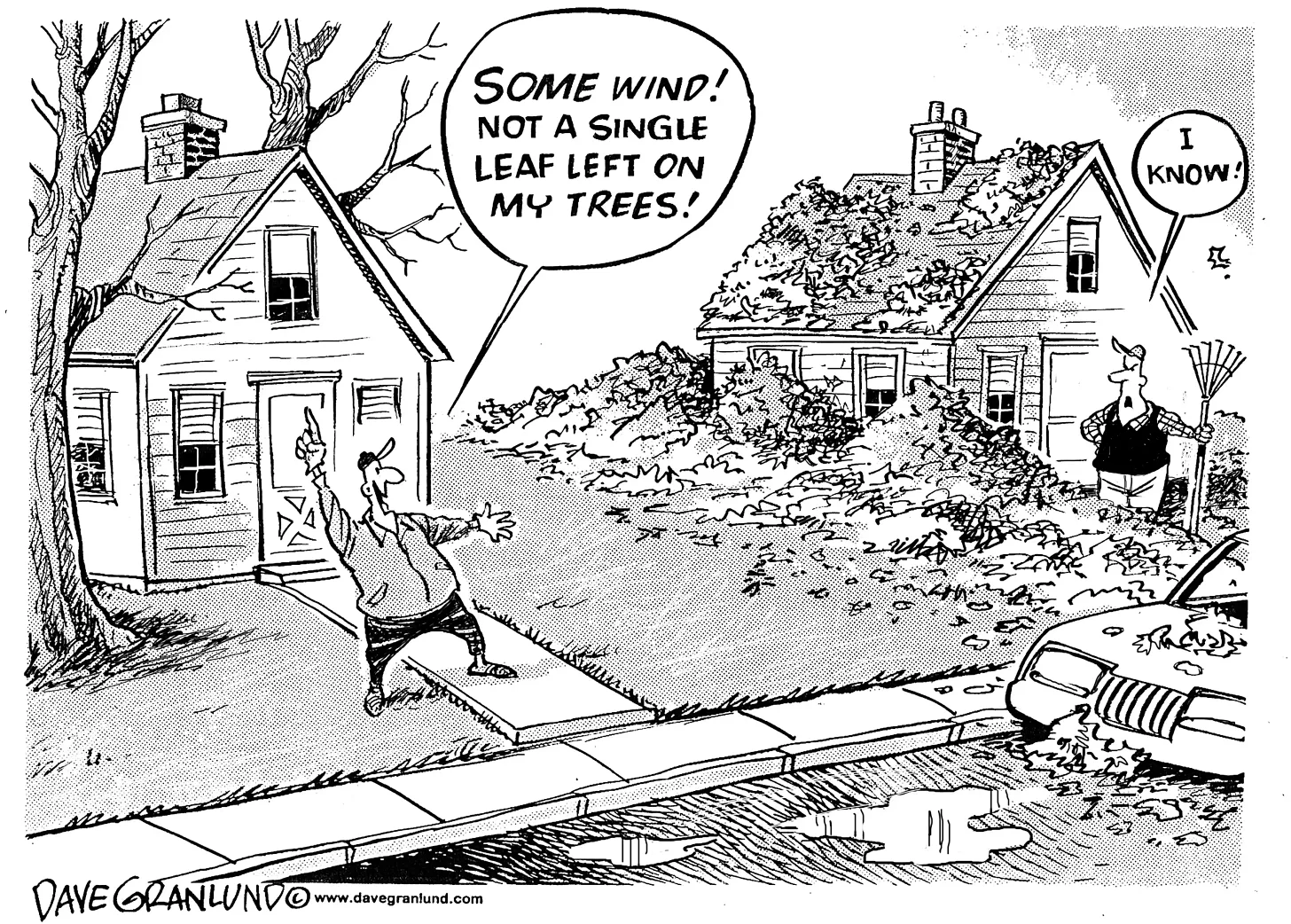Last weekend, I watched my neighbor meticulously blow every leaf from his driveway, directly onto mine. As I stood there amid a swirling cloud of oak leaves that weren’t mine five minutes ago, I realized I was witnessing something far more common than inconsiderate lawn care.
I was seeing the leaf blower mindset in action.
The Problem With Problem-Shifting
The leaf blower mindset is the reflexive impulse to solve our problems by making them someone else’s. We meet a deadline by creating chaos for our colleagues. We feel better by venting our frustrations onto our partners. We clear our conscience by deflecting blame onto our teams.
Like an actual leaf blower, this approach offers immediate relief. Your space looks cleaner. You feel lighter. Problem solved… for you.
But here’s what research on responsibility and organizational behavior reveals: when we habitually shift our problems onto others, we don’t actually solve them. We multiply them. And we erode the very relationships we need to thrive.

Research by Nathanael Fast at USC and Larissa Tiedens at Stanford found that blame-shifting is socially contagious. When people see others deflecting responsibility, they become more likely to do it themselves. This creates accountability sinkholes or situations where problems become everyone’s problem and therefore no one’s problem. Projects stall. Trust evaporates. And paradoxically, the deflectors themselves become less effective over time because no one wants to collaborate with them.
The leaf blower mindset absolves us of responsibility in the moment, but it compounds our problems in the long run.
Why Smart People Blow Leaves
Before we judge the leaf blowers among us too harshly, it’s worth understanding why this mindset takes hold. In my conversations with organizational psychologists, three forces tend to fuel it:
- Cognitive load overflow
When we’re overwhelmed, our brains search for the path of least resistance. Offloading a problem to someone else feels like survival, not selfishness.
- Emotional regulation shortcuts
Venting or delegating our discomfort provides immediate relief. It’s the psychological equivalent of a pressure valve; quick but ultimately ineffective.
- Systemic reinforcement
In many workplaces and relationships, the squeaky wheel gets the grease. People learn that the fastest way to get relief is to make their problem loud enough that someone else handles it.
None of this makes the behavior acceptable, but it does make it understandable and clarifies what we can do next.
Three Strategies to Ground Yourself
If you recognize the leaf blower mindset in yourself (and if we’re honest, most of us do), here are three evidence-based strategies to break the pattern:
1. Apply “The Return Policy”
Before you delegate, vent, or deflect — ask yourself:
“If this problem came back to me in six months, would I be better or worse off for having shifted it?”
This quick mental simulation shifts your attention from immediate relief to long-term outcomes. Psychologists call this prospective hindsight, a method involves imagining future consequences before acting. Research shows it increases accountability and reduces impulsive choices.
Consider the colleague who asks for last-minute help because they procrastinated. The return policy helps you see that saying yes teaches them to repeat the behavior and keeps you stuck in the same loop.
A better response might be:
“I can’t this time, but let’s set up a regular check-in so you get feedback earlier.”
You’re not withholding help. You’re interrupting a pattern that harms both of you.
2. Build a “Responsibility Inventory”
Once a week, write down three problems you faced and how you handled them.
Then ask:
“Did I own this, or did I hand it off?”
This is not an exercise in self-criticism. It’s pattern recognition. Adam Grant’s research on feedback loops shows that people often miss their own behavior until they create a structure for observing it.
The strength of this practice comes from specificity. Instead of a vague feeling such as “I complain too much,” you might realize something clearer: “I vented to Sarah about the same issue three times instead of raising it with my manager.”
Once you see the pattern, you can interrupt it. You might choose to have the difficult conversation you have been avoiding. You might set firmer boundaries instead of scrambling later. You might finally address the actual problem instead of circulating it.
3. Establish “Problem Ownership Agreements”
Have an explicit conversation with your key relationships — including your partner, team, and close friends — about how you’ll handle problems together.
This approach may sound formal, but research on relationship maintenance shows that unspoken expectations create far more conflict than explicit ones.
A simple framework is:
“When I’m struggling with something, I’ll tell you whether I’m looking for help solving it, empathy while I work through it, or just someone to listen. And I’d love it if you did the same for me.”
This creates clarity about when you’re genuinely collaborating and when you’re unloading. It transforms venting into connection and builds trust because everyone understands the difference between “I need support” and “I am making this your responsibility.”
The same principle applies at work. You might say: “When I delegate this project, here is what I am handing off and here is what I am staying responsible for.”
Transparency prevents the leaf blower dynamic where everything ambiguous becomes everyone else’s problem.
The Surprising Upside
Here’s what I’ve learned from people who’ve successfully shifted away from the leaf blower mindset: taking responsibility for your problems doesn’t mean carrying them alone. It means being intentional about how and when you involve others.
When you stop reflexively shifting your problems onto other people, something remarkable happens. People start trusting you more. They lean in instead of pulling back. They’re more willing to help when you genuinely need it because they know you’re not just looking for someone to blow your leaves onto.
The goal isn’t perfect self-sufficiency. It’s thoughtful interdependence.
My neighbor eventually came over to help me with those leaves. Not because I demanded it, but because I mentioned it directly and without accusation: “Hey, I noticed the leaves ended up in my yard. Can we figure out a system that works for both of us?”
We raked them into bags in fifteen minutes.
Sometimes the best way to clear your space is to stop leaf blowing and start building.
I wish you all the best,
Dr. Samantha Boardman






